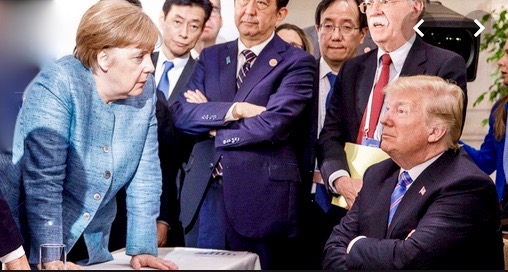Hyung Jun You Writes — Funeral for Liberalism? After President Trump won the election, there were waves of articles from academics and journalists about the death of liberalism and American led world order. The cover of 2017 January/February issue of Foreign Affairs boldly said, “Out of Order: The Future of International System”. These views gained more attraction after President Trump decided to pull out of the Paris Climate Agreement, Joint Comprehensive Plan of Action (Iran nuclear deal), and the Trans Pacific Partnership (TPP). Plus, he never got tired of attacking international organizations, when in fact the architect of them was the United States.
Should we start planning a funeral for liberalism? Not so fast. Even though leaders like President Trump are disrupting the liberal world order and strong cooperative relationships and alliances that have lasted for decades, he is far from destroying it outright. As G. John Ikenberry pointed out in his seminal book “Liberal Leviathan”, the liberal world order is stronger than we think, and it will endure even as America’s economic power gets overshadowed. No single nation can solve problems such as climate change and terrorism alone. Also, economic interdependence has created a wide web of trade networks that’s impossible to untangle by pulling out of few trade agreements. We don’t need to hold a funeral. Far from it.
What Has Liberalism Done to Us? The liberal world order we have today is a product of American leadership and vision after the fires of World War II were put out. The United Nations and Bretton Woods financial institutions, World Bank and International Monetary Fund, created a rule based system in international politics and economy. That didn’t mean a single world governing body emerged to dictate states behavior but it meant, as laid out by the US Treasury Department press release, that “If these two great international institutions (IMF and World Bank) are to achieve the mission which the world has so hopefully entrusted to their care, it will require the wholehearted and concerted cooperationof each of the member countries and their people”.
That effort to achieve “concerted cooperation” is precisely the reason why the liberal world order endured for so long and attracted both democracies and autocracies alike. Even though the Soviet Union and the US competed for military power, both nations cooperated to reduce the number of nuclear arms when it threatened international security. Today, while the U.S. and Russia seems to be marching into “hot peace”, a phrase coined by Michael McFaul, both nations have worked together through the Security Council on Libya campaign and combatting Somalian pirates.
We certainly cannot ignore the enormous impact free trade has had on promoting peace. For centuries, liberal ideals have lit the world by enhancing individual lives through spreading technological innovations and encouraging free trade. After 1940s, the U.S. led liberal order pushed for lower tariffs, free flow of ideas, goods, capital, and people. This in turn made nations that were once foes interdependent towards another which raised the costs of war. One only needs to look at datasets from Correlates of War to see that the rates of interstate war has gone down dramatically since 1945. This web of interdependence achieved what Woodrow Wilson talked about in 1917 when he said, “There must be, nota balance of power, but a community of power; not organized rivalries, but an organized common peace.”
This high level of interdependence, even between rivals such as the U.S., China, and Russia, has made the liberal order difficult to disassemble. But this order faces new challenges. The threat is not coming from non-democracies, but from democracies such as the U.S. with President Trump, Great Britain with Brexit, the Philippines with President Duterte and so on. How will liberal world order endure during this great time of distress?
The Core Remains Strong: It will endure because of its ability to adapt to new challenges. As mentioned, the liberal world order attracted democracies and autocracies alike. It provided economic and security benefits not only to the U.S. but to the world as well. Even though President Trump has railed against international institutions and free trade agreements through Twitter, his actual policies suggests otherwise. He renegotiated the free trade agreement with South Korea, which is also what President Obama did with Korea because he was not satisfied with the way President Bush negotiated. President Trump has also renegotiated NAFTA with Canada and Mexico, and instead of scrapping NATO, he has urged European nations to invest more in their defense. Again, similar to what President Obama urged European leaders to do during his first term in office.
Furthermore, in areas where the U.S. has withdrawn its leadership position, other nations and leaders has come forward to carry the baton and lead the way. Japan revived the TPP project and got eleven Pacific-Rim countries, plus Canada, to ratify it under a new name, Comprehensive and Progressive Agreement for Trans-Pacific Partnership. Leaders such as Emmanuel Macron and Angela Merkel have spoken strongly about the importance of international institutions and liberal values such as open trade. Chinese President Xi Jingping even said in 2017 at Davos that the Chinese “should commit ourselves to growing an open global economy.”
The liberal world order we have today was shaped by the U.S. but its longevity will not be decided by America’s erstwhilehegemony. As shown above, America will continue to enjoy the benefits of liberalism and anyone who occupies the Oval Office will recognize that. However, even as America takes a backseat in leadership, other nations, because they want to continue and expand the benefits of liberalism, will make sure that the liberal order survives. Graham Allison said in 2017 that the liberal order is a ‘myth’. Well, it turns out others believe in this ‘myth’ and want to see it succeed.
Hyung Jun You, LMU ’19, is a contributing editor to Asia Media International

